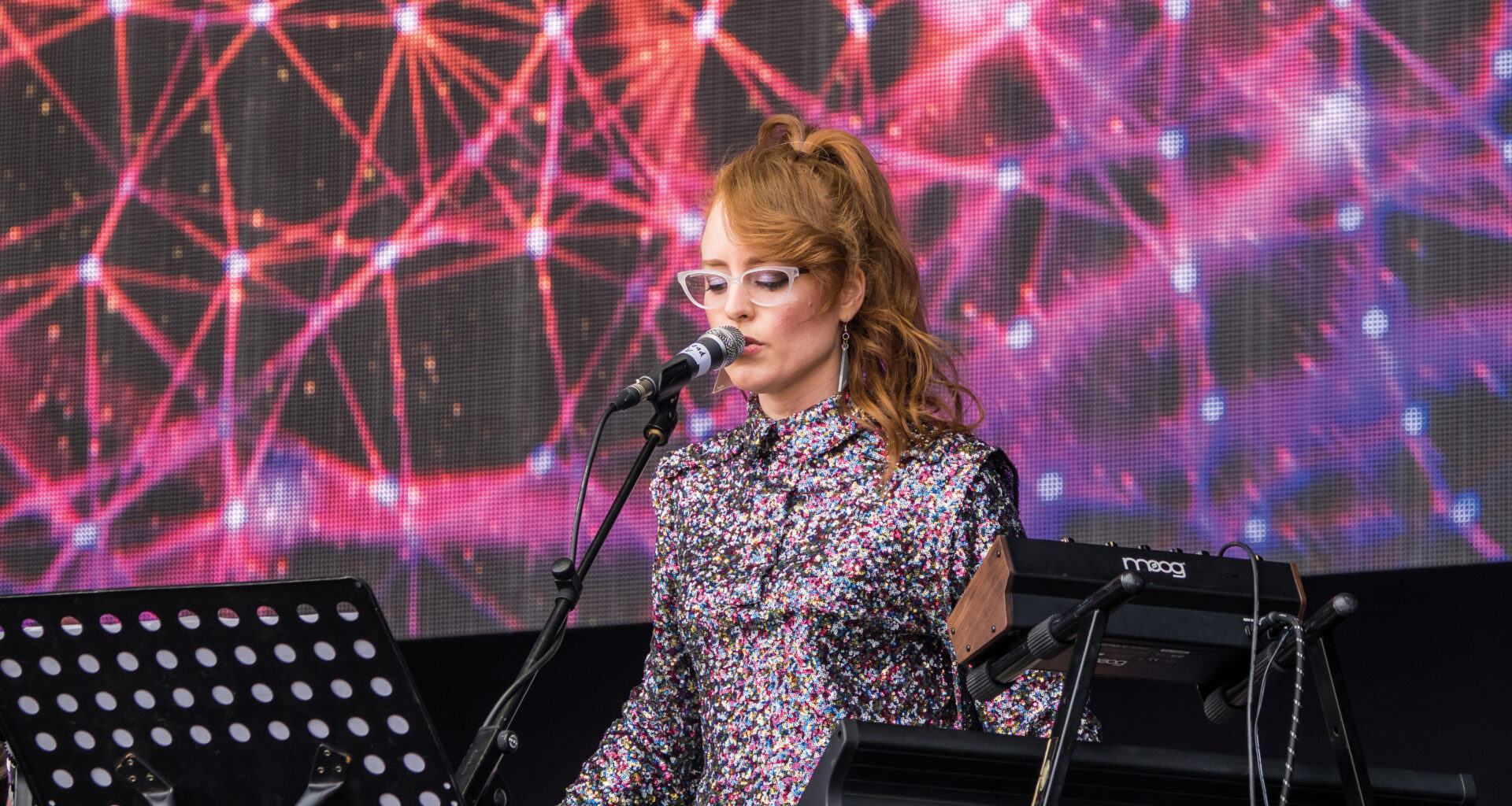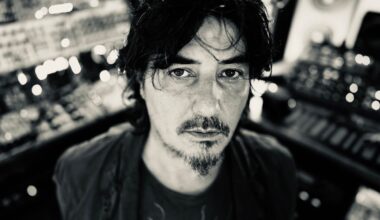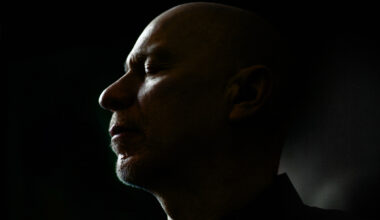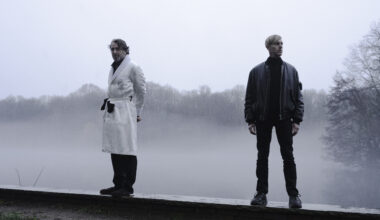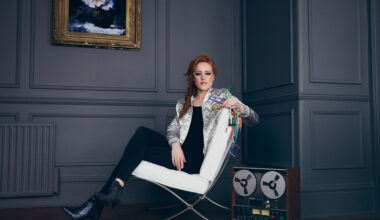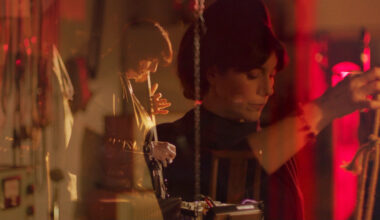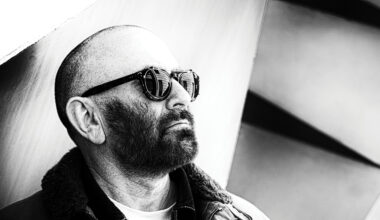Donning her Mary Casio alter ego, Hannah Peel pairs up analogue synths with a full brass band and plots an interplanetary musical adventure to the stars
Cobbled roads. Hovis bread. Terraced houses. A nebula throbbing with all the energy of the universe. One of these things is different from the others, right? Not for Hannah Peel. On her new album, the chimneys of northern England and the spirals of distant solar systems are closer than you’d expect.
You will know her name by now. She’s the John Foxx collaborator, Magnetic North member whose solo long-player ‘Awake But Always Dreaming’ was Electronic Sound’s 2016 album of the year. While that work explored her grandmother’s dementia and subsequent loss of memory, this new record is something quite different.
‘Mary Casio: Journey To Cassiopeia’ teams analogue synthesisers with a full brass band. Through experimental electronics and swelling orchestration, it tells the story of stargazer Mary Casio and her dream to leave the terraces of Barnsley to visit the constellation of Cassiopeia. You’ll know the constellation. It’s the giant W above our heads, a billion years old, countless light years away. Impossible to reach… for almost all of us.
I meet Hannah and the brass band – called Tubular Brass – on a glorious sunny day at Cheshire’s Bluedot festival, where the night stars seem as far away as they’ll ever be. The artist area behind the main stage looks like a hipster barracks: a titanic marquee with functional benches softened by cushions and flowers. The 29 members of Tubular Brass mill around, parping their horns, honking their trombones. They consist of championship-standard players from across the UK. Their name is a reference to their signature piece, a big band outing of Mike Oldfield’s ‘Tubular Bells’, which they’ll be performing in full alongside Hannah’s ‘Mary Casio’.
“You couldn’t imagine a more perfect festival,” says Hannah preparing for the fun and games. “I feel like we’ve achieved a dream by coming here. The sound of a brass band is so loud, such an incredible planetary expanse. I like the idea of the electronics getting their moment to shine with the brass: you go through the atmosphere, a moment of calm, and that leads into a dusty nebula, looking back at the beauty of earth.”
Mary Casio, the titular hero of the album, is partly Hannah’s alter-ego, but is also someone who seems to be living inside her. When Hannah talks, she speaks of “discovering Mary”. This “crazy pioneering inventor” is as real as if she was sitting next to us on the cushioned benches digging into a bag of peanuts – the only food left by a hungry band.
“She’s inspired by the likes of Delia Derbyshire, who slipped under the radar for so long, only becoming a personality after she’d died,” offers Hannah. “I felt that Mary would never be discovered. She’d live a life in Barnsley, a stargazer, always dreaming of Cassiopeia.”
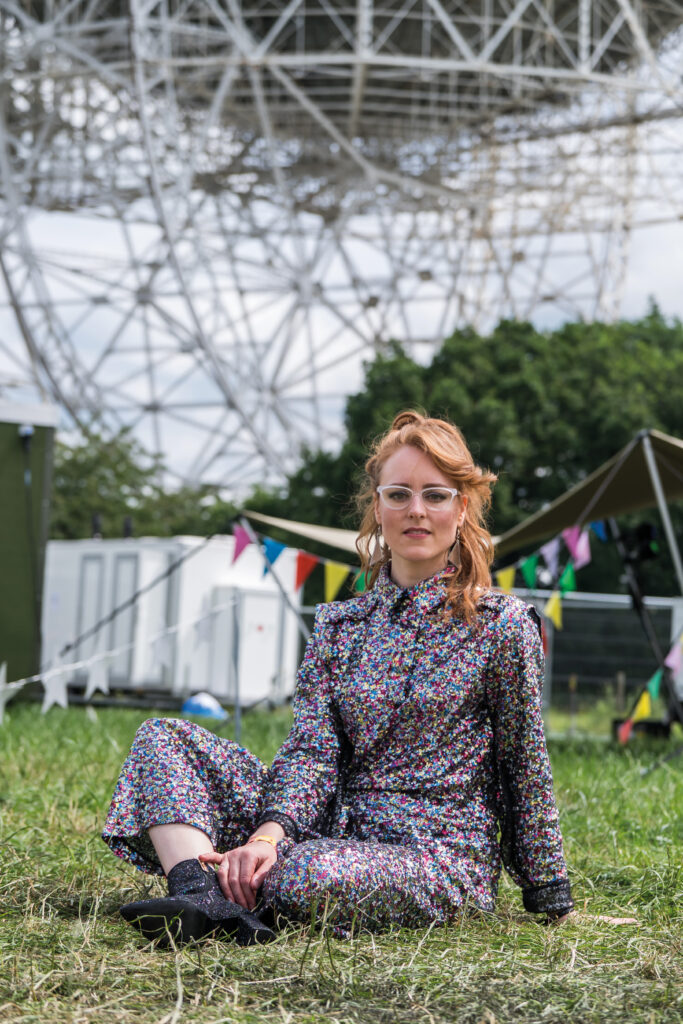
In the album’s narrative, Mary has never left northern England. As distorted samples and the rasps of vintage synths meet the warm uplift of euphoniums and tubas, Mary feels the pull of the stars along with us. The sun glinting through meteoric clusters, the chasms of deep space, the romance of planets suspended in a vacuum, you can hear it all. The music is at times rhythmic, at times brooding, at times full of levity. In the devastating final track, ‘The Planet Of Passed Souls’, the full pomp of the band meets a tiny, tinkling music box. It’s a beautiful dichotomy, and as the story ends, we could be far off into another galaxy – or simply caught in a planetary pipe dream.
“Has this old lady embarked on a huge rocket, taking all her instruments into space?” speculates Hannah. “Or is it her imagination, and is she just sitting in her back garden looking at the stars? Or is it her final breath, and is that her passing into another realm?”
The whole thing took shape when Tubular Brass were looking for a partner piece for their Oldfield set, a work that wasn’t long enough on its own for a full live event. The band’s mission statement declares their intention to “perform contemporary music and develop collaborations with a host of artists from across the musical spectrum”. To boldly brass band where not many have brass banded before. The spark for Hannah’s piece struck when a traditional community event met modern social media.
“While I was on tour with East India Youth in 2015, we went to see the Whit Friday marches in Saddleworth,” explains Hannah. “We went to a little village called Dobcross to watch the bands march and it was mind-blowing. I took a picture of us for Instagram captioned ‘electronic meets brass’.”
Her own mission statement was born. Before long, Hannah found her way to Jeremy Davies from Root Music, who was asked by Tubular Brass to commission a new piece for a collaboration with the band, something that could be performed live alongside ‘Tubular Bells’.
“We met in London to talk through it,” she says, “and we were next to a ‘Star Wars’ arcade machine. It seemed like the right place to tell him my idea about Mary Casio going to space.”
The Tubular Brass arranger and conductor Sandy Smith is no stranger to twists on old traditions, and proved a natural travelling companion for Hannah in her mission. He’d played on 1997’s ‘Acid Brass’, that saw the Williams Fairey band team up with Turner Prize-winning Jeremy Deller to play acid house and techno classics. ‘Voodoo Ray’, ‘What Time Is Love?’, ‘Strings Of Life’… it’s a far cry from whippets and pints of mild.
“With brass bands, people think of ‘Brassed Off’, collieries and cloth caps,” says Sandy. “You’ve got to use music that the audience have a bit more of a connection with.”
Hannah mapped out basic chords for the band and then Sandy worked on the score. Composing alongside vintage electronics shouldn’t be rocket science, but it almost derailed the project.
“The brass instruments will go slightly out of tune depending on the temperature,” says Sandy, “and Hannah’s synths can be a wee bit temperamental as well. We did the first performance on 1970s analogue synths, but they were too awkward.”
“There was feedback, things went out of tune, oscillators got knocked, it was too much,” says Hannah. “On the record I use the vintage stuff, but live I now use the Juno-60, which is very stable, then a Moog Little Phatty for the bass and a Moog Mother-32 for the high end.”
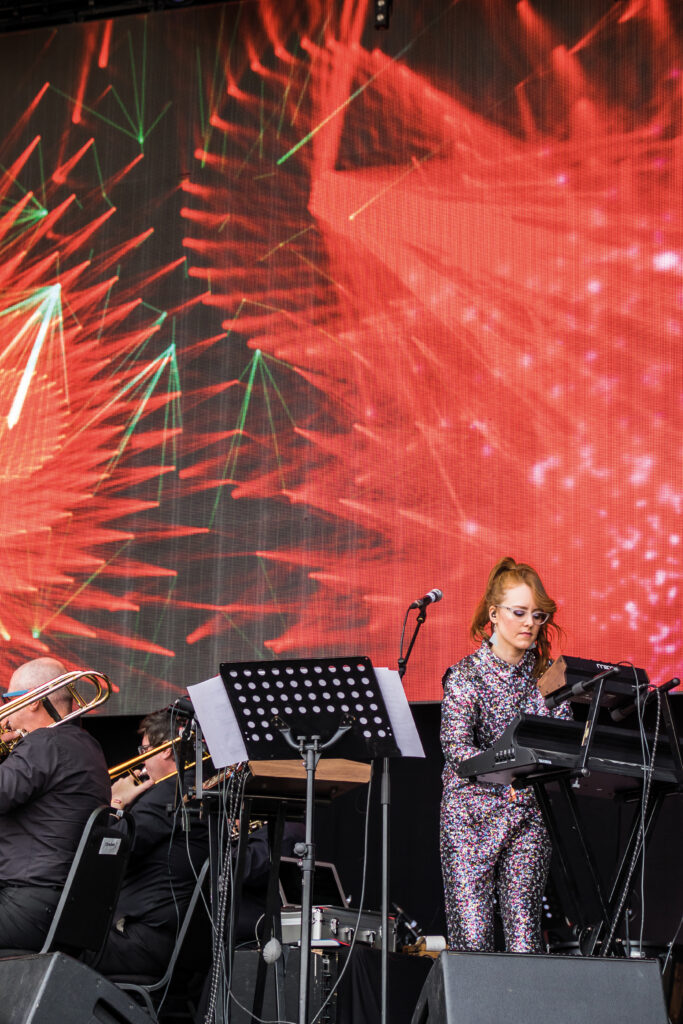
There are samples aplenty too. Near the beginning of the album you can hear wind chimes, suggesting the suburban gardens of Yorkshire and Mary’s farewell to planet Earth, but they were actually sampled at a roadside in Los Angeles. You’ll also hear a warped slow-motion cement mixer, ticking clocks and the juddering walls of a caravan in a storm. On central track ‘Andromeda M31’, a Tannoy voice breaks through the surface. It comes from a novelty audio greeting card telling Hannah her horoscope. Virgo, if you must know. But perhaps the most remarkable sample on ‘Mary Casio: Journey To Cassiopeia’ is the voice of her own grandfather from when he was a choirboy in 1928. It provides an emotional end to the album.
“When my grandfather died, this lost recording was played at his funeral,” says Hannah. “It was one of the first boy soprano recordings made onto wax cylinder, recorded at Manchester Cathedral. They weren’t happy with how the wax had set, so they went back to record him and his voice had broken the day before they arrived. He would have never heard that recording again.”
This echo through time leaves the listener with the very distinct impression that Mary has ended up on a planet of ghosts, or perhaps lays the suggestion that the journey was in her mind all the time.
“It felt like she’d landed in a place in which things would float through your mind,” says Hannah, “this links to my last album, which is all about losing your memory.”
It’s time for the gig. The brass band has hoovered up the last of the backstage food: Sainsbury’s meal deals rather than the stereotypical pies. Hannah Peel stands stage left as Tubular Brass take their seats. The opening electronics of ‘Goodbye Earth’ allow the brass to swell, and quickly there are moments when it’s difficult to tell the synthesisers from the orchestration, a clever – and deliberate – sonic trick.
In more traditional brass concerts, the band will honk out ‘Jerusalem’, then take a breather before launching into ‘Go Tell It On The Mountain’. No such respite here: both ‘Mary Casio’ and ‘Tubular Bells’ are non-stop tooting, or in Sandy’s words, “lip-benders”. Sandy has doubled up the instruments, with players taking on the parts in couples. This allows them to ebb and flow throughout the performance as energy levels dictate.
There’s another challenge too. Brass bands come from the grimy pits, faces all ruddied and blackened, under t’earth, not from outer space. From working men’s clubs to village squares to Salvation Army halls, their surroundings tend to be quite intimate. Despite the staggering experience of this brass supergroup, large outdoor spaces like Bluedot present particular problems. At one point, a music sheet launches into the air, while a trombone player precariously holds his score in place with his slide (he doesn’t miss a note). It’s all part of the festival drama.
“When we do it in indoor venues, it is like you’re on a spaceship going on an intense journey,” explains Hannah, her metaphors forever beautifully in orbit with Mary. “People tell me they cry because of the power rattling through them. But with an outdoor festival, I can’t feel that so much, so you’ve got to have a little bit more fun with it.”
The Bluedot crowd take it in their stride as they lounge on the grass. The dying chords of ‘Mary Casio’ drift through the Cheshire sunshine and the brass band strikes up for ‘Tubular Bells’. Hannah returns to the stage to introduce the instruments, the Viv Stanshall role on the original record. The instruments have changed (“bass guitar!” becomes “bass trombone!”), but the sense of occasion remains the same. And the tubular bells are still tubular bells. It leaves me wondering where Mary Casio is now.
“She’s definitely off in the clouds,” says Hannah, after the show. “What I plan to do with her is something like a ‘Star Wars’ trilogy or ‘Alien’ series, where you get the before and the after. I’d like to explore where she was before she decided to leave for Cassiopeia.”
We talk again about Delia Derbyshire, a once-forgotten musical genius who made her own lonely journey into unknown lands. With Hannah’s use of found sound throughout the album, Delia’s name is never far away. Indeed, Hannah recently played a special Coventry Cathedral show dedicated to the work of the Radiophonic Workshop experimentalist on what would have been Delia’s 80th birthday.
“The story is so sad, her and Daphne Oram, the way they pursued their things. They didn’t follow anyone and what they did has benefited me and other people. They are my role models and they’re not here. We don’t have any other role models with that level of experimentation who are pioneering music electronically.”
Pioneers like Mary, I suggest. ‘Mary Casio: Journey To Cassiopeia’, the story of a traveller in far-flung space, will be heard across planet Earth, along its cobbled roads and terraced houses. And however many light years there are stretching between her and us, I truly hope Mary will be listening.
Hannah Peel’s ‘Mary Casio: Journey to Cassiopeia’ is out on My Own Pleasure
